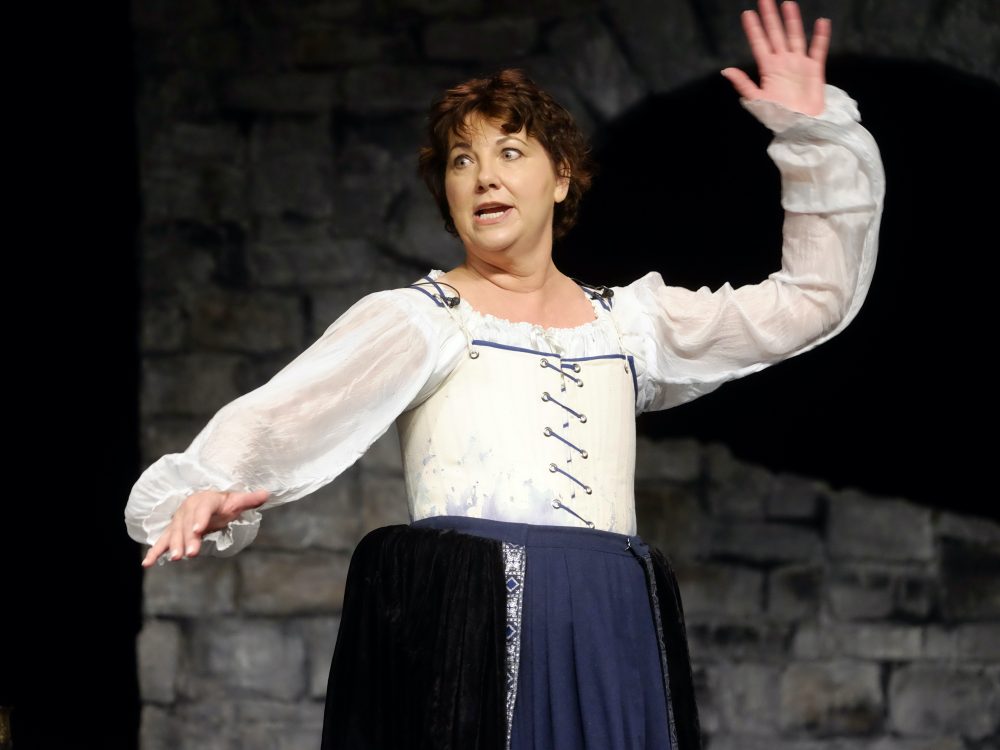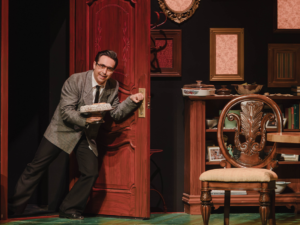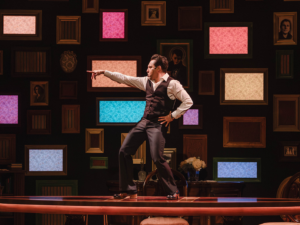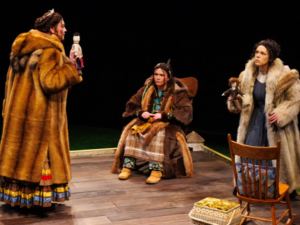Move over, Shakespeare — your wife is taking centre stage.
This summer, Shakespeare on the Saskatchewan (SOTS) is presenting more than just works by “The Bard” himself.
The annual festival by the river will be producing two additional plays by Canadian playwrights in addition to their main production of Cymbeline. The first of those shows is Shakespeare’s Will, a one-woman play by renowned playwright Vern Thiessen.
Lisa Bayliss is the one woman at the centre of the play, starring as William Shakespare’s wife Anne Hathaway. Bayliss spoke with PodSask ahead of opening night about the show.
PodSask: Tell me a little about Shakespeare’s Will. It’s something unlike what we’re used to seeing from SOTS.
Lisa Bayliss: It’s a beautifully written piece by (Canadia playwright) Vern Thiessen that has had quite a bit of success. It’s been produced nationally and internationally … it’s an incredible opportunity for a mature actress to play a character who is a true historical figure, the wife of William Shakespeare. But historically we don’t really know very much about Anne Hathaway. The bare facts we do know are that she was married to William Shakespeare, raised their three children in Stratford-upon-Avon, while Shakespeare left early on the marriage to go to London and ultimately become a famous playwright.
They had quite separate lives … famously, we do have the actual will Shakespeare left when he died where he famously leaves Anne only the second-best bed. There has been speculation by scholars and historians over the years as to what this meant. Was it a slight to Anne, or was it a romantic gesture since in those days the second-best bed was the marital bed, nobody really knows. But the playwright took this piece of actual information and … spun a story around Anne Hathaway. We know a lot about William Shakespeare, but to be able to take Anne and create this incredibly funny, independent, feisty, very sensual woman who is dealing with all kinds of tragedies and adversities but in the end comes through with the most amazing spirit … she comes to life onstage in a very beautiful way.
PS: Like you said, we don’t know a lot about Anne Hathaway. Does that change how you approach a character in a show like this, where you don’t know a lot about a historical person you’re playing?
LB: It doesn’t change things too much. I do my research and find out everything that I can factually about the character. But beyond that, the approach is the same as any character I play. I take the words, I use my own experience and my own lived memory and my own imagination and skill and I weave all that together with a little dash of instinct — and the character sort of comes to life. I don’t know how else to describe it!
PS: Did you also research William Shakespeare for the role?
LB: Yes, a little bit. I wanted to find out some facts about the years they were living, what life would have been like in England at the time … I found it very interesting that Anne was eight years older than William Shakesepare. We know he was only 18 when he married her and she was 26, and we do know she was pregnant when they married … just looking at the framework of the time, and how they would have lived and realizing how rich Shakespeare became and what a huge estate Anne ended up having to run by herself.
PS: In all of this research, what were you most surprised to learn?
LB: I was interested to learn that a woman was, at that time, able to live independently, was able to make decisions, was able to run her household on her own and that was accepted. I was also very interested to learn, through the lens of this play, that Anne was allowed not only to be independent, but sexually independent. As written, she had many lovers. There was a special agreement between her and William Shakespeare, and it was accepted in her society, in her town, that as a married woman she was able to do this without too much comment.
PS: That’s definitely not something most people would think about for the time!
LB: That’s right! We think of them as very stayed and conservative, when in fact I think the society, at least in the lower and middle classes, was anything but!
PS: A one-woman show is rare for SOTS. What are some of the challenges when you’re the only performer?
LB: There’s certainly more pressure, because you’re up there by yourself with no fellow actors to support. From a physical and vocal standpoint, it can be challenging for an actor. When you don’t have a scene partner, an acting partner on stage, you have the audience. So the audience becomes very important to bounce the ideas, to bounce the action, the words off of.
For this play, it’s really a memory play. It’s Anne reliving her life during the marriage to William Shakespeare. And she’s grieving the loss of him also, and like many of us do when we’re grieving or looking back over our lives, we re-live conversations and events in our mind, and we can hear the voices of the other people that we’re missing. When I’m having these conversations, I’m acting out all these different people … it’s not just me telling a story, I’m voicing all these different characters as well. The audience gets to be a fly on the wall to hear all of these conversations Anne is having in her mind and in her dreams … it’s very intimate, it’s very beautifully written, it’s so funny and real and earthy and honest that it’s really like a conversation.
PS: For a show that’s this intimate and this internal, it sounds like there are some advantages to being the only performer on stage.
LB: That’s true! You only have yourself to rely on. But you can take it, you can take a one-person piece and make it completely your own. It’s like performing a piece of music — you’re using your own feelings, emotions, instincts, and weaving that sound exactly as you’re feeling it … and that’s exactly what’s happening with me onstage.
PS: What do you hope the audience will take away from a show like this?
LB: I hope the audience is going to be touched. That’s what you always want. You want the audience to feel a connection to the story you’re telling, and you want them to go away feeling heart-warmed. This play has so much — it’s got a lot of humour, it’s really heart-wrenching, there’s some incredibly tragic moments that many of us have experienced, the loss of people that we love. It’s very, very sexy (laughs) which people may not be expecting. It’s just a really unusual night of theatre and I hope people are going to really connect and enjoy it.
Shakespeare’s Will runs at Shakespeare on the Saskatchewan from July 14 to 31. Tickets are available at www.shakespearesask.com.
This interview has been edited for length and for clarity.






